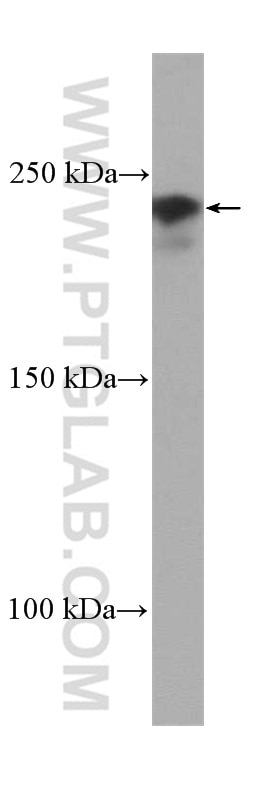- Phare
- Validé par KD/KO
Anticorps Polyclonal de lapin anti-TRIP12
TRIP12 Polyclonal Antibody for WB, ELISA
Hôte / Isotype
Lapin / IgG
Réactivité testée
Humain
Applications
WB, ELISA
Conjugaison
Non conjugué
N° de cat : 25303-1-AP
Synonymes
Galerie de données de validation
Applications testées
| Résultats positifs en WB | cellules MCF-7, |
Dilution recommandée
| Application | Dilution |
|---|---|
| Western Blot (WB) | WB : 1:500-1:1000 |
| It is recommended that this reagent should be titrated in each testing system to obtain optimal results. | |
| Sample-dependent, check data in validation data gallery | |
Applications publiées
| KD/KO | See 2 publications below |
| WB | See 2 publications below |
Informations sur le produit
25303-1-AP cible TRIP12 dans les applications de WB, ELISA et montre une réactivité avec des échantillons Humain
| Réactivité | Humain |
| Réactivité citée | Humain |
| Hôte / Isotype | Lapin / IgG |
| Clonalité | Polyclonal |
| Type | Anticorps |
| Immunogène | TRIP12 Protéine recombinante Ag18112 |
| Nom complet | thyroid hormone receptor interactor 12 |
| Masse moléculaire calculée | 1992 aa, 220 kDa |
| Poids moléculaire observé | 190-220 kDa |
| Numéro d’acquisition GenBank | BC114556 |
| Symbole du gène | TRIP12 |
| Identification du gène (NCBI) | 9320 |
| Conjugaison | Non conjugué |
| Forme | Liquide |
| Méthode de purification | Purification par affinité contre l'antigène |
| Tampon de stockage | PBS avec azoture de sodium à 0,02 % et glycérol à 50 % pH 7,3 |
| Conditions de stockage | Stocker à -20°C. Stable pendant un an après l'expédition. L'aliquotage n'est pas nécessaire pour le stockage à -20oC Les 20ul contiennent 0,1% de BSA. |
Protocole
| Product Specific Protocols | |
|---|---|
| WB protocol for TRIP12 antibody 25303-1-AP | Download protocol |
| Standard Protocols | |
|---|---|
| Click here to view our Standard Protocols |
Publications
| Species | Application | Title |
|---|---|---|
Mol Cell TRIP12 promotes small-molecule-induced degradation through K29/K48-branched ubiquitin chains.
| ||
Clin Epigenetics EZH2 K63-polyubiquitination affecting migration in extranodal natural killer/T-cell lymphoma
|


